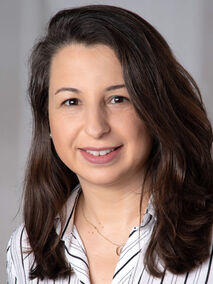AG Joint Heidelberg-IDC Translational Diabetes Program
Our research group constitutes a joint lab that connects research activities at Heidelberg University Hospital and the Institute for Diabetes and Cancer at Helmholtz Munich (https://www.helmholtz-munich.de/en/idc).
Our lab is interested in gaining deeper insight into the molecular mechanisms of metabolic diseases. The ultimate goal is to develop novel therapies against identified targets that play a role in disease development or contribute to reduced treatment efficacy.
Recently we identified that evolutionarily conserved TSC22 protein family member TSC22D4 promotes diabetic hyperglycemia, insulin resistance, fatty liver disease and pathologies associated with liver fibrosis. Mechanistically TSC22D4 interacts with Akt kinase, the central mediator of insulin signaling pathway. TSC22D4-Akt interaction in the liver plays a critical role in maintaining systemic glucose homeostasis.
Currently, our research projects hold two main goals:
- Preclinical studies to develop therapeutic interventions targeting TSC22D4 in type 2 diabetes-associated liver fibrosis.
- To understand the biological basis of type 2 diabetes with a further focus on TSC22 protein family - not only in the liver but also in pancreatic beta cells.
Ausgewählte Publikationen
- Demir S, Wolff G, Wieder A, Maida A, Bühler L, Brune M, Hautzinger O, Feuchtinger A, Poth T, Szendroedi J, Herzig S, Ekim Üstünel B. TSC22D4 interacts with Akt1 to regulate glucose metabolism. Sci Adv. 2022 Oct 21;8(42):eabo5555.
- Sakurai M, Weber P, Wolff G, Wieder A, Szendroedi J, Herzig S, Ekim Üstünel B. TSC22D4 promotes TGFβ1-induced activation of hepatic stellate cells. Biochem Biophys Res Commun. 2022 Aug 27;618:46-53.
- Wolff G, Sakurai M, Mhamane A, Troullinaki M, Maida A, Deligiannis IK, Yin K, Weber P, Morgenstern J, Wieder A, Kwon Y, Sekar R, Zeigerer A, Roden M, Blüher M, Volk N, Poth T, Hackert T, Wiedmann L, De Angelis Rigotti F, Rodriguez-Vita J, Fischer A, Mukthavaram R, Limphong P, Tachikawa K, Karmali P, Payne J, Chivukula P, Ekim-Üstünel B, Martinez-Jimenez CP, Szendrödi J, Nawroth P, Herzig S. Hepatocyte-specific activity of TSC22D4 triggers progressive NAFLD by impairing mitochondrial function. Mol Metab. 2022 Jun;60:101487.
- Demir S, Nawroth PP, Herzig S, Ekim Üstünel B. Emerging Targets in Type 2 Diabetes and Diabetic Complications. Adv Sci (Weinh). 2021 Sep;8(18):e2100275. doi: 10.1002/advs.202100275.
- Loft A, Alfaro AJ, Schmidt SF, Pedersen FB, Terkelsen MK, Puglia M, Chow KK, Feuchtinger A, Troullinaki M, Maida A, Wolff G, Sakurai M, Berutti R, Ekim Üstünel B, Nawroth P, Ravnskjaer K, Diaz MB, Blagoev B, Herzig S. Liver-fibrosis-activated transcriptional networks govern hepatocyte reprogramming and intra-hepatic communication. Cell Metab. 2021 Aug 3;33(8):1685-1700.e9.
- Bühler L, Maida A, Vogl ES, Georgiadi A, Takacs A, Kluth O, Schürmann A, Feuchtinger A, von Toerne C, Tsokanos FF, Klepac K, Wolff G, Sakurai M, Ekim Üstünel B, Nawroth P, Herzig S. Lipocalin 13 enhances insulin secretion but is dispensable for systemic metabolic control. Life Sci Alliance. 2021 Feb 3;4(4):e202000898.
- Ekim Üstünel B, Friedrich K, Maida A, Wang X, Krones-Herzig A, Seibert O, Sommerfeld A, Jones A, Sijmonsma TP, Sticht C, Gretz N, Fleming T, Nawroth PP, Stremmel W, Rose AJ, Berriel-Diaz M, Blüher M, Herzig S. Control of diabetic hyperglycaemia and insulin resistance through TSC22D4. Nat Commun. 2016 Nov 9;7:13267.






